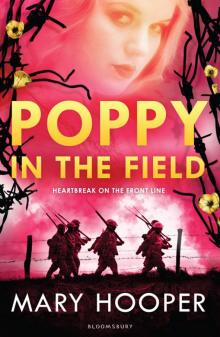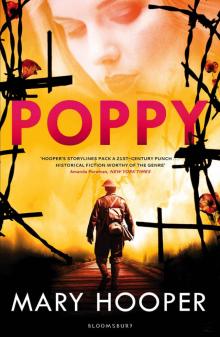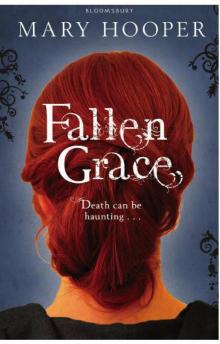- Home
- Mary Hooper
Poppy in the Field Page 7
Poppy in the Field Read online
Page 7
‘I remember being carried out of the trench . . .’ he muttered, then his voice slurred, his head dropped to one side and his body slumped.
Either he was sleeping, Poppy thought, or he’d lapsed into unconsciousness. She could only tell he was still alive because of his hoarse breathing.
‘First of all, I’m going to get you out of that uniform,’ she said. She’d been told to always explain what she was doing to a patient, even if he seemed to be unconscious. Besides, she found that she was strangely reassured by the sound of her own voice speaking so rationally and calmly, as if she was confident about what she was doing. ‘It’s going to be difficult cutting through this tough uniform, but it’s better off than on, and the doctors have to see what they’re dealing with.’
With heavy scissors Poppy cut through the thick khaki material, removed some things from an inside pocket of his army jacket and put them into his locker.
‘There’s your wallet going in your locker,’ she said, ‘and some letters and a photograph of a very pretty girl sitting on a farm gate. They’ll all be quite safe here.’
She peeled off the front of the jacket and tried to ease out his right arm. He woke and started to shout almost immediately, grabbing her hand with his own good one and begging her to stop, to leave him alone.
‘I can’t do that,’ she said. ‘It’s what we have to do – get you ready for the doctors to see you so they can decide what treatment you need. I have to do it,’ she repeated. ‘I’m so sorry if it’s painful.’
She slit the sleeve of his jacket right up to the armpit and then lifted the material off, trying not to wrinkle her nose at the strong smell of sweat. Slowly, carefully, she began to unwind the sodden bandage around his shoulder that had been put on by someone at a bandaging station. She thought that, very probably, one of his wounds had got infected, for there was no mistaking the foul stink of gangrene. By now, he had passed out again.
Taking off the last twist of bandage, the wound where his arm met his shoulder was exposed and Poppy was relieved to see that, although quite serious, it was by no means the worst injury she’d ever seen. There were lice and fleas on him, too, which had crawled out from the seams of his uniform and were now dropping on the floor around them. There was nothing she could do about these, however, apart from tread on as many as she could.
Working quickly, she dropped the jacket pieces on the floor and cut off the two vests he wore, trying to breathe in a shallow way. She knew that sometimes, if a man had lost his kit or become separated from his platoon, it meant he had to stay in the same clothes, socks and boots for two or even three weeks. Six weeks was the most she’d heard of – and she didn’t want to hazard a guess about the things Tibs was wearing.
‘Now I’m going to start cleaning you up,’ she said. ‘And, Tibs, it looks as though you really need it.’
She sponged the top half of him as carefully as possible, coming and going to the little kitchen and getting fresh water then dabbing him dry. This done, she laid a blanket over his top half to keep him warm. Alongside her, the other nurses and VADs were doing the same with various degrees of difficulty. One of the new boys clearly didn’t know where he was because he was shouting at the top of his voice, ‘Help! Leave me alone! Get your hands off me!’ Another was crying with pain and trying to curl into a ball, which was making his nurse’s job very hard.
The bottom half of Tibs looked like it would be more problematic, but the trousers weren’t going to come off until his boots and filthy, stinking puttees which wound around his calves were removed, so she decided to tackle these first. His feet were stuck hard inside his boots, so one of the other nurses had to give her some cutters, which enabled her to slit down the front of the boot and ease his foot out that way. This she did.
As she began to unwind the filthy, clammy fabric of the puttees, the stench that hit her was so ghastly that she knew some of his flesh must have gone gangrenous. She walked to the window, took a deep breath and then returned to her patient.
‘Not much longer, Tibs,’ she said, trying to sound as if this wasn’t the most dreadful task she’d ever undertaken in all her life. ‘Just your socks to go.’
Carefully, gently, she began to roll his sock down, exposing his ankle and foot, which was sodden, pale and flabby, like the flesh of a dead fish. Trench foot, she thought. She’d seen it before, but never so bad as this. She started to peel away his sock from his foot in order to expose his toes and found two of these were black. Not black with dirt, but black because they were dead. The thick sock he’d been wearing had somehow embedded itself in the flesh of his foot and she had to cut and gently prise out the sock’s fibres from his toes as well as she could. As she took off the last bits of the sock, however, a toe came with it, completely rotted away.
Poppy dropped the toe on to a metal tray together with the sodden scraps of material and, feeling herself swaying, held on to the head of the bed. She put the surgical scissors down on the locker and managed to get to the window, where she held on to the sill to keep herself upright. She breathed deeply.
Sister Gradley, seeing her gulping air, came over. ‘Difficult one?’ she asked.
‘Just a little,’ Poppy said, her voice shaky. ‘Bad shoulder wound, trench foot and gangrene. Loss of at least one toe.’
‘You’ve done very well so far,’ said Sister Gradley, ‘but do you want me to help you now?’
Poppy was reluctant to say that she couldn’t manage, but, moved by Sister’s kind concern and the dread of what might be found when the second boot was removed, said, ‘Yes, please. Perhaps you could help me get his other boot and puttee off?’
‘Of course.’
Fifteen minutes later, Tibs was washed and pyjamaed, and Sister had moved on to help someone else. When exposed, the flesh on his other foot had been white and dead-looking, and his toes grey, but at least they’d still been attached to his foot, so Sister thought there was a good chance that most of them could be saved. The covering had now been removed from the mattress and Tibs’s bed had been made up around him, with a cage at the foot preventing the bedclothes from touching his toes. He’d been given drugs to ease the pain and had fallen into a deep sleep. The doctors not being expected imminently, Sister pulled the screens around Tibs’s bed and told Poppy to go and get some sleep herself.
Poppy found, however, that although immensely tired, she was strangely reluctant to leave the ward. Tibs seemed completely out of it, but she squeezed his good hand, said she hoped he’d have a reasonable night and that she’d see him in the morning. Looking at him, so pale, with his poor injured feet, his gashed cheek and the wound in his shoulder, she felt an overwhelming surge of tenderness for him, even though they hadn’t exchanged more than a few words. She wondered if his mother or sweetheart (the girl on the gate?) were waiting at home for news of him. Had they already heard he was missing? Were they, fearing that telegram, becoming alarmed at every knock on the door?
It was two o’clock in the morning and she had to be on duty in just over five hours. Suddenly feeling she had to lie down or she’d keel over, Poppy went to her bed.
Chapter Ten
As it turned out, Poppy was awake by five o’clock in the morning and found it impossible to get back to sleep, anxiously wondering how Tibs was and if anything terrible had happened to him overnight. Might she have missed something vital? A shard of glass, a piece of shrapnel?
Trying not to wake her fellow nurses, she washed in the little bathroom, then went into the canteen and helped herself to a breakfast of two small fried eggs on toast.
She found an English newspaper, only a week old, which concentrated mostly on the battles and skirmishes that the Allies had won, but carefully omitted to say at what cost they had been achieved. The newspaper was strident in its praise of the generals in charge and informed the public that Britain was gaining land and definitely moving towards victory. All very gung-ho, Poppy thought, but not exactly the story they were hearing from the boys who were
just back from the front. There were no photographs of British casualties, of course, in case it should affect morale, so the only dead soldiers anyone ever saw in newspaper pictures were German ones.
The paper contained recipes for making soup from potato peelings and several features urging its readers to make do and mend, but, extraordinarily, the centre pages were given over to photographs of a big charity party in a candlelit ballroom in London. Here, there seemed to be no war. Here, ladies in shiny, sparkling gowns were being swirled around the dance floor by gentlemen in evening dress. The bill of fare was given: lobster and fillet steak, followed by rare, out-of-season fruits. The party, it declared, had been held in aid of the war effort, but – eating her extremely small eggs and knowing of the shortages at home – Poppy wondered why it had needed to be quite so lavish. Couldn’t everyone just have stayed at home and sent the money instead? How did all those who were eating potato-peel soup and unravelling their jumpers to knit balaclavas for soldiers react on seeing such extravagance? She sniffed disapprovingly over the photographs, then studied each one to make sure none showed Freddie and the new Mrs de Vere.
Going into Ward 5 at the beginning of her shift, she found Sister Gradley wasn’t yet in, but two of the nurses were deep in conversation with a white-gowned doctor. Not wanting to interrupt and anxious to know how Tibs was, Poppy slipped behind one of the screens and tiptoed towards where she’d left him.
He was still there, and he’d clearly been operated on, but he looked uncomfortable and awkward. The gash in his cheek was neatly stitched, his arm – newly bandaged, but already showing blood – was out at an angle, and his poor white feet with blackened toes were covered with a square of cloth.
‘Tibs,’ Poppy whispered. ‘How are you feeling?’
Tibs’s eyelids opened and he looked at Poppy.
‘You came into this hospital last night,’ she explained. ‘The ambulance brought you over from a clearing station. I got you ready for the doctors, cut you out of your boots. You may not remember – you seemed to be unconscious for most of the time.’
‘You’re the VAD?’ he asked in a hoarse whisper.
‘That’s right!’ said Poppy.
‘How many toes have I lost?’
Poppy thought of the toe that had come off with his sock and pulled a sympathetic face. ‘I’m afraid you’ve lost one for sure.’
‘Only one?’
‘For now, but I don’t know what the surgeons will do about the others. Didn’t they say anything to you when they examined you?’ she asked, for even with her limited medical knowledge it seemed obvious that several of his toes would have to be removed surgically.
‘By the time the doctors arrived, I was barely conscious. And then I went straight in for an op, of course.’
Footsteps were heard on the other side of the screen and, to Poppy’s great surprise, Michael Archer – the doctor who’d been talking to the two nurses – appeared.
‘Nurse Pearson! How nice to see you,’ he said pleasantly, as if they were meeting at a social event. He patted Tibs’s good shoulder, then raised his eyebrows at Poppy. ‘You’re Private Burroughs’s personal nurse, are you?’
‘Well,’ Poppy began, rather embarrassed. ‘It’s just that I looked after him last night when he came in and I kind of feel, you know, responsible.’
‘Very commendable,’ Michael Archer said. ‘And as a matter of fact, I feel responsible, too, because Private Burroughs came through our clearing station.’
‘Did I? I don’t remember,’ Tibs said.
‘I’m not surprised. I only had time to give you a quick examination, but my boss asked me to keep track of you. We’re going to try out something fairly new on Private Burroughs here, if Sister agrees.’
‘On my toes?’ Tibs croaked.
‘Not your toes – I’m afraid the damage has already been done there. It’s your arm that the doctors are concerned about now. We don’t want you to lose it.’
‘The wound looks quite clear at the moment,’ Poppy said.
Michael Archer nodded. ‘There’s a new treatment which consists of continually irrigating the wound with a spray of disinfectant. It’s been found to prevent the infection which can lead to gangrene.’
‘Sounds all right. Can I have it?’ Tibs asked.
‘I certainly hope we can give it to you and several other suitable candidates in this ward. I’m going to speak to Sister about it now.’
Tibs opened his eyes again. ‘Last night, when I came in, I know I wasn’t a pretty sight.’ He nodded towards Poppy. ‘She did me all right, though.’ He looked towards his feet and grimaced. ‘I’m not a pretty sight now, come to think of it.’
‘Trench foot isn’t pleasant, but remember that it’s better to lose a toe than a nose,’ Michael Archer said as he left them.
Later, as Poppy collected the breakfast trays, she overheard two of the nurses talking of the new method of irrigating wounds.
‘A young doctor came up from one of the clearing stations to tell us all about it,’ one was telling another. ‘Apparently it’s having remarkable results and really cutting down on the number of amputations.’
‘Doctor Archer is a really nice chap,’ Poppy blurted out. They looked at her in surprise. ‘He was at Netley and so was I,’ she explained. ‘Oh gosh, I was so green. It was my first day and I didn’t realise he was a doctor. I thought he was going to faint, so made him sit down and pushed his head between his legs!’
The following morning produced another reminder of Netley: a picture postcard of the hospital with, on the other side, a message from Matthews.
Still at Netley
28th March 1916
Just a line to let you know that I have applied to Devonshire House to work as a VAD in France – and been accepted!
There! I know you’ll be pleased. Of course, I don’t know where they’ll send me, but I’ll try very hard to get close to Boulogne and contact you soonest.
Much love,
Matthews
As if this news wasn’t good enough, Poppy had Dot and Tilly to cheer up her off-duty hours, and – even better – another week went by and Sister Shrew had not returned. There were rumours that the Shrew was worse and that the infection had spread throughout her body, then they were told that she was being sent to a sisters’ hospital in Calais, prior to returning to England. Feeling a little two-faced, Poppy signed a get well card that the boys in the ward had made, writing on it, Hope you’ll soon be feeling better. It would have been nice to have added, as one of the nurses suggested, We miss you on Ward 5, but this would have been an out-and-out lie. She didn’t miss her one bit.
Under Sister Gradley, Poppy felt that at last she was doing what she’d come to France to do: nurse. As a bonus, the ward staff were more relaxed and the patients seemed to pick up on this. There were even pranks played by those who were well enough. On 1st April, an orderly came in with a message saying that King George was going to pay a visit to Ward 5, sending the whole place into a fever of tidying and polishing before Sister realised what the date was. No one would have dared do such a thing if Sister Shrew had been in charge on April Fool’s Day.
There were many in the ward, of course, who were not well enough to play pranks: boys who not only had wounds that were slow to heal, but had picked up infections and diseases from the vile conditions on the battlefields. Even if they seemed all right in the daytime, some of them had seen too much. They’d wake screaming in the middle of the night or find it near impossible to get to sleep at all because of the visions that afflicted them. One man had witnessed his best friend blown to pieces in front of him; another’s pal had died splayed on barbed wire; yet another, his injured legs smashed so he was unable to move, had seen his mate slowly drown at the bottom of a trench filled with filthy water. Poppy and the other nurses knew that, with some of the lads, even if their visible injuries healed, those wounds in their minds might not.
At the end of that week, a young corporal came in, barely c
onscious, with a ghastly injury to his head and a bullet which had penetrated his lung and couldn’t be removed.
‘He can’t be operated on,’ Sister Gradley said. ‘I’m afraid he’s just been brought in to die.’ She looked out of the window and Poppy saw her take several deep breaths, as if trying to keep her feelings under control. ‘We can keep him comfortable, that’s all, and try to make his last hours reasonably pleasant and pain-free.’
She asked Poppy to get the details of his family so she could write to them, and Poppy looked through his pockets, telling the lad what she was doing and asking his permission as she did so. In his breast pocket she found a field postcard which the boy had addressed to his mother, ready to send. His family were in Scotland, though, so there seemed little chance of them getting to France before he died. The corporal had already filled in the postcard, ticking the box which said he was in the pink, but the bullet which had entered his lung had passed right through the card, leaving a clean round hole in the box marked I have been injured.
Poppy handed it over to Sister, who, after some thought, sent it on to the boy’s family with a letter saying he was near the end, but was pain-free and quite peaceful.
‘In years to come they’ll be pleased to have that postcard,’ she said.
He died that night.
The next morning, Sister, announcing the sad news to her staff, said she couldn’t help but be relieved, for with such terrible injuries the corporal would have been severely brain-damaged. Later that morning, she reminded the boys to send their field postcards home.
‘Remember, if your people haven’t heard that you’re safely with us, they may think you’re missing.’ She looked round at them all. ‘I often get letters from worried mothers asking if I’ve got their boys in my ward. I heard about one poor soul who goes to meet every troop train that arrives at Victoria station in London, even though her boy’s been missing for a year and is, of course . . .’ She spread her hands and didn’t have to finish the sentence.

 At the Sign of the Sugared Plum
At the Sign of the Sugared Plum Zara
Zara Megan 3
Megan 3 Holly
Holly By Royal Command
By Royal Command Newes from the Dead
Newes from the Dead Amy
Amy Poppy in the Field
Poppy in the Field Poppy
Poppy Velvet
Velvet At the House of the Magician
At the House of the Magician The Remarkable Life and Times of Eliza Rose
The Remarkable Life and Times of Eliza Rose Chelsea and Astra
Chelsea and Astra The Betrayal
The Betrayal The Disgrace of Kitty Grey
The Disgrace of Kitty Grey Fallen Grace
Fallen Grace